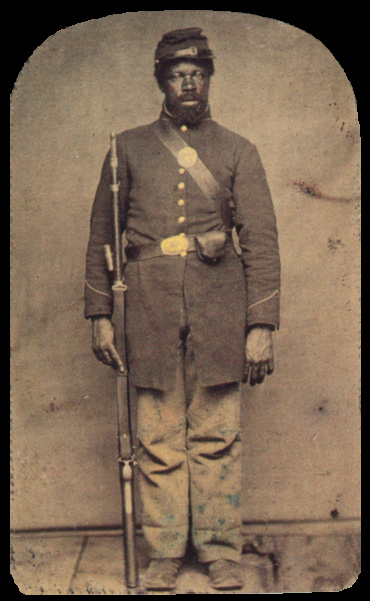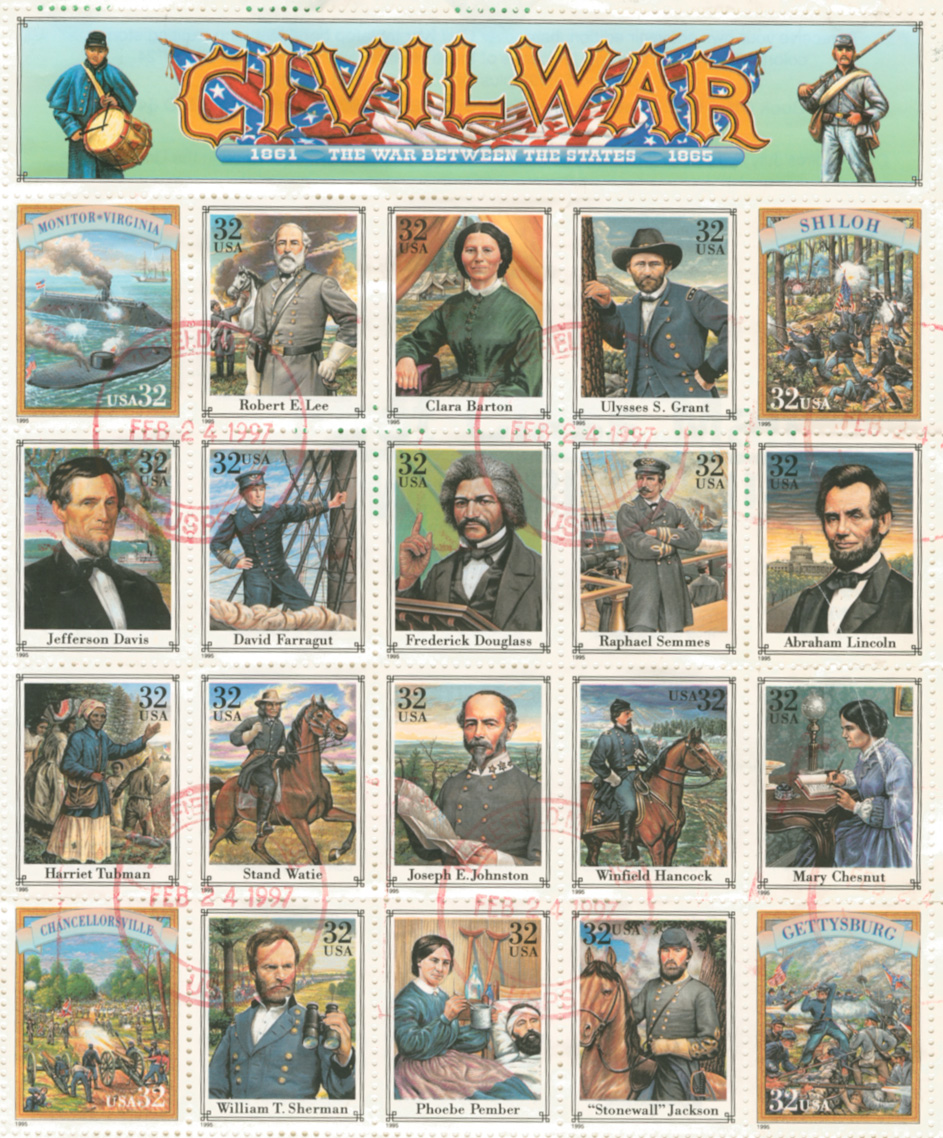"Sop... Daar kommie Alabama"
Quote from Steve on May 8, 2020, 9:56 amAs a boy I sat around countless camp fires in the dark with my friends, the light from the flames flickering on our faces as we sang along on school, church and scout camping excursions and adventures. (Scouting was the most fun!). Among the songs we sang were "Little Brown Jug, how I love thee", (this was nothing less than a call to prepare for a life of future alcoholism), "Knick Knack Paddy Whack, give a dog a bone", (the existential pointlessness of existence), "Ten Green Bottles" (back to the alcoholism of the guy who emptied the bottles), "Sarie Marais", (so poignant I can't bear to write about it) and "In the Quartermaster's Store", ("my eyes are dim I cannot see, I have not brought my specs with me". Yes, where are they?). Another favourite was "Daar kom die Alabama" (Afr. there comes the Albama), perhaps because it was closer to home and said something instinctively familiar about our experience, even if it was in Afrikaans and an oblique reference to slavery, (revisionist historians suggest it is a merger of an older Dutch / VOC slave era song with a more modern one about a memory of slavery).
The PDF link beneath the two images below will tell you a more about Arthur Green, the Confederate raider, the CSS Alabama, Emil Burmester and the US Naval History Centre. Regarding the image of the 'Negro' Union Infantryman, below, I chose him because he has a face that seems to be immediately familiar to me as a South African. I knew a Fingo who looked much the same whose ancestors had fought for the British. Wendell Phillips said in a Civil War speech, "Will the slave fight? If any man asks you, tell him No. But if anyone asks you will a Negro fight, tell him Yes!". That statement is true for free men everywhere. The sheet of used American stamps includes one dedicated to Raphael Semmes, captain of the Alabama, later Rear Admiral, Confederate States Navy. As the US Navy would not have him back after the war a southern university gave him a sinecure as Professor of Moral Philosophy! He probably thought himself a Democrat!
As a boy I sat around countless camp fires in the dark with my friends, the light from the flames flickering on our faces as we sang along on school, church and scout camping excursions and adventures. (Scouting was the most fun!). Among the songs we sang were "Little Brown Jug, how I love thee", (this was nothing less than a call to prepare for a life of future alcoholism), "Knick Knack Paddy Whack, give a dog a bone", (the existential pointlessness of existence), "Ten Green Bottles" (back to the alcoholism of the guy who emptied the bottles), "Sarie Marais", (so poignant I can't bear to write about it) and "In the Quartermaster's Store", ("my eyes are dim I cannot see, I have not brought my specs with me". Yes, where are they?). Another favourite was "Daar kom die Alabama" (Afr. there comes the Albama), perhaps because it was closer to home and said something instinctively familiar about our experience, even if it was in Afrikaans and an oblique reference to slavery, (revisionist historians suggest it is a merger of an older Dutch / VOC slave era song with a more modern one about a memory of slavery).
The PDF link beneath the two images below will tell you a more about Arthur Green, the Confederate raider, the CSS Alabama, Emil Burmester and the US Naval History Centre. Regarding the image of the 'Negro' Union Infantryman, below, I chose him because he has a face that seems to be immediately familiar to me as a South African. I knew a Fingo who looked much the same whose ancestors had fought for the British. Wendell Phillips said in a Civil War speech, "Will the slave fight? If any man asks you, tell him No. But if anyone asks you will a Negro fight, tell him Yes!". That statement is true for free men everywhere. The sheet of used American stamps includes one dedicated to Raphael Semmes, captain of the Alabama, later Rear Admiral, Confederate States Navy. As the US Navy would not have him back after the war a southern university gave him a sinecure as Professor of Moral Philosophy! He probably thought himself a Democrat!
Uploaded files:Quote from Jamie Smith on June 23, 2020, 5:43 pmSteve, You bring back memories. From 1967 until about 1987 I sang with a few pop-groups in Vereeniging, The Question Marks, Take 5 + 2, The Jam Fans, and Enigma.
From 1970 to 1976 the last two groups played at the Lido in Eikenhof and then at my own night club at the Pop Inn back in Vereeniging where except for Liz and myself the group was Afrikaans - Pierre, Derek, Chris, Tina, Alex, Uri, Phillip-John and Clive to mention just a few over the years.
All that just to get to the punch line. We used to play a medley - She'll be coming round the mountain, Marching to Pretoria, Daar is' (a chicken that can't lay an egg), Mary-Ann and of course 'Daar Kom die Alabama'!
Just to finish (which I thought I was), I came back to the U.K. at the age of 72 and was pulled into a Swing Band - 'Swing and Swing Again' a (21 piece Glen Miller type band) who I sang with until March last year and only left at the age of 84 because of a hip operation.
And not a stamp was mentioned.
Jamie
Steve, You bring back memories. From 1967 until about 1987 I sang with a few pop-groups in Vereeniging, The Question Marks, Take 5 + 2, The Jam Fans, and Enigma.
From 1970 to 1976 the last two groups played at the Lido in Eikenhof and then at my own night club at the Pop Inn back in Vereeniging where except for Liz and myself the group was Afrikaans - Pierre, Derek, Chris, Tina, Alex, Uri, Phillip-John and Clive to mention just a few over the years.
All that just to get to the punch line. We used to play a medley - She'll be coming round the mountain, Marching to Pretoria, Daar is' (a chicken that can't lay an egg), Mary-Ann and of course 'Daar Kom die Alabama'!
Just to finish (which I thought I was), I came back to the U.K. at the age of 72 and was pulled into a Swing Band - 'Swing and Swing Again' a (21 piece Glen Miller type band) who I sang with until March last year and only left at the age of 84 because of a hip operation.
And not a stamp was mentioned.
Jamie
Quote from Steve on June 23, 2020, 6:39 pmHi Jamie, Welcome aboard. I am so pleased that you are here making a post. This is Excellent.
Yes, how could I forget "She'll be coming round the mountain, when she comes" ,,... how did I forget that one. As a boy I was always mystified by the lyrics - how could the lady ride three white horses? - but after I became a man, well, I began to think it wasn't really a children's song at all. So, after you made that post, I did a quick google on it and it turns out it is based on a gospel song. It must have been corrupted over the years.
Hi Jamie, Welcome aboard. I am so pleased that you are here making a post. This is Excellent.
Yes, how could I forget "She'll be coming round the mountain, when she comes" ,,... how did I forget that one. As a boy I was always mystified by the lyrics - how could the lady ride three white horses? - but after I became a man, well, I began to think it wasn't really a children's song at all. So, after you made that post, I did a quick google on it and it turns out it is based on a gospel song. It must have been corrupted over the years.
Quote from Steve on May 20, 2025, 9:56 amIt is five years later and I have revisited this post! )
Having recently read and re-read Ron Chernow's 'Grant' (2017), a profound biography about one of America's three greatest Presidents, what struck me most about the preceding post was not the CSS Alabama's infamous exploits in Table Bay but rather the sheet of USA stamps celebrating the Civil War which U. S. (Unconditional Surrender) Grant brought to a brutal but generous conclusion.
In stark contrast to the many White South Africans who continue to unthinkingly use the term 'Anglo-Boer War' to describe the conflict of 1899 - 1902, most Americans are perhaps more appreciative of the subtleties of US Civil War history than South Africans are of theirs. South African history was manipulated and then hidden from us! And, to a lesser extent, the same has happened in America.
The more inclusive term, 'South African War', correctly, IMO, recognises that our war affected all South Africa's people, among these 16,000 dead Blacks in British 'Refugee' / Concentration Camps, 100,000 forcibly relocated (and paid) to work on the railway line defences, and 1000s armed to man blockhouses at night. The used sheet of American stamps reflects the fact that the USA recognises that the Civil War was not one fought exclusively between hard-working White Yankees and slave-owning Southern Good Old Boys.
Blacks were the meat in the sandwich in both conflicts. In America their contribution in the Civil War met only with grudging acceptance from the US War Department. In SA the participation of Blacks in the war earned them no praise whatsover. In fact, just the opposite. After 1910 when the White Union of SA was being created for Whites only there was an unpsoken need to give the myth of a White SA some historical context. The best ways was keep the war of 1899 - 1902 a 'White Man's War'. I remember being told by a populist historian that "the Boer War was last war fought exclively by White men" and then he shook his head and laughed ironically, "ja, it was fought in Africa!" Myth-making, not historical fact, is the main reason for the use of the racist term 'Anglo-Boer War'.
Today the tragedy of the cover-up that is the 'Anglo-Boer War' is that Black participation was never fully recognised until too late. Indeed, the intent was always to white-wash all Black involvement out of it in order to maintain the myth. Today a new generation of majority Black South Africans have swallowed this is BS and now see themselves as having had no share in our shared past colonial history. Sadly, they believe the White Man's lies as told to White Men by White Men! Below is what happens when you manipulate history and tell people untruths, like "your ancestors did not participate in this war. You have no share in your country's history!".
Circa 1905. Postcard. 'Horse Memorial, Port Elzabeth. No. 5'.
An estimated 300,000 horses died in British service during the SAW.
Worldwide there are only a handful of equestrian statues showing the contribution of horses in war.
This statue was previously regarded as one of the most beautful of its kind.
Note that this statuee refers to the war as the 'Anglo-Boer War'.
2015. This is what happens when you deny people their country's history!
The monument was vandalised by politically motivated activists. It worked. It got my attention!
Would this have happened if the South African War was owned by all its people?Of most interest to me among the stamps on the US Post Office sheet is Stand Watie, the slave-owning native American who fought for the Confederacy. He had his own political motivations that generally do not sit comfortably with today's woke, revisionist Democratic correctness. Watie was not so much fighting for the South in order to keep his slaves but rather to keep the land on which he and his people lived, land that had beern constantly stolen and eroded by treaty and treachery. He believed that his betrayed native-American people would get a better, straighter deal from the Southern Confederates than from the forked-tongued politicians in Washington. (Shades of 'The Outlaw Josey Wales'!)
General U S Grant, a late-comer to the Republican Party, was one of the most progressive politicians of his era in terms of giving post-war justice to Blacks and native-Americans alike, attempts that were ultimately scuppered by southern Democrats who wanted to maintain their old status quo. According to Chernow, "Americans today know little about the terrorism that engulfed the South during Grant's presidency. It has been suppressed by a strange national amnesia. .... By the end of Grant's second term, white Democrats, through the 'redeemer' movement, had reclaimed control of every southern state, winning in peacetime much of the power lost in combat. They promulgated a view of the Civil War as a righteous cause that had nothing to do with slavery but only states' rights - to which an incredulous James Longstreet" (himself a senior Confederate Lieutenant-General) "once replied "I never heard of any other cause of the quarrel than slavery"." How did the Democrats get away with it? How did the the party of slavery re-invent itself as the American Left?
Circa 1860. Stand Watie, also known as Standhope Uwatie and Isaac S. Watie.
A prominent Cherokee leader and Confederate General in the US Civil War.
He was the second principal chief of the Cherokee Nation from 1862 to 1866.
He was the only Native American to hold the rank of General in the Confederate Army.
He was also the last Confederate General to surrender at the end of the Civil War.
Source: Medium.There is a tenuous connection between Stand Watie and South Africa and the South African War. Colonel John Blake, the leader of the Boer's Irish Brigade, was a West Point graduate and ex-US 6th Cavalry officer who had served in the Apache wars and exchanged gifts with Geronimo. He claimed to have some Cherokee blood. (His great-grandson, Michael Blake, wrote the bestseller 'Dances with Wolves'.) Blake's Indian ancestry is disputed but it is believed that his older brother Larkin and his cousin James Wyeth Blake "traded as white" (Golden Nemesis. Heather Vallance. 2009.). Both fought with Brigadier-General Watie at the Battle of Pea Ridge, Arkansas. Colonel John Blake was the badly wounded hero of Pepworth Hill during the Siege of Ladysmith. His book, "A West Pointer with the Boers", copyrighted in 1903 and published in 1904, uses the term "Anglo-Boer War", one of the earliest examples of such use.
Another American supposedly involved in the South African War was Tom Mix, the Western hero of the silent screen. Mix reportedly broke wild horses in Denver for the use of the British military in the war. Other accounts also have him travelling to South Africa to deliver these horses to the British Army. Quite how he managed to participate in the Siege of Ladysmith where he supposedly received wounds to his shoulder and arm is hard to fathom. The legend of Tom Mix is deep and murky, rather like that of Ranse Stoddard, the "hero" who shot Liberty Valance, even though another man, Tom Doniphon, actually did it. The iconic phrase "When the legend becomes fact, print the legend" highlights how the West's mythology often prioritised storytelling over truth. Below is an image of John Wayne who played Tom Doniphon in 'The Man Who Shot Liberty Valance' (1962). Wayne is seen standing in a classic Tom Mix pose at the end of John Ford's 'The Searchers' from 1956. . This is Wayne's tribute to Tom Mix's influence on him and the Western movie.
1956. 'The Searchers'. Directed by John Ford.
"Ride away. Ride away".No doubt, some are wondering how I can be so liberal and also be an obvious fan of the Western genre. A short answer is that I am neither liberal nor woke. I believe in facts, the truth. Everyone, left or right, should be the possessor of these same facts. If you do not accept them and or do not believe them but prefer instead your own manipulated political prejudices, you are no longer honest.
The Searchers' is widely regarded today as a racist movie. In its defence it is a product of its time, a reasonably realistic look at the adversity our pioneering ancestors lived with. It depends, perhaps, how you view 'The Searchers'. If all it is to you is entertainment, then it is racist and gratuitously so. But if you view it as an historic attempt to create a reasonably accurate portrayal of the savage interaction between settlers and native-Americans in the American south-west in 1870 then you are less likely to be offended by it. It is pretty much how things were. One hase no pleasantries for one's enemies in a world where it is kill or be killed. John Ford has recreated a time and place we are lucky not to have to live in.
And finally, as this is a philately club, here is a stamp of someone we would be honoured to have as a member.
This tenth stamp in the US Post Office's Legends of Hollywood Series honours the American film legend, John Wayne. Artist Drew Struzan based his painting for the stamp on a black-and-white publicity still of Wayne taken during the filming of "The Man Who Shot Liberty Valance", directed by John Ford (1962). Ford made many movies with John Wayne including a trilogy of Cavalry movies. My favourite is probably his 'She Wore a Yellow Ribbon' (1949). In this John Wayne plays the role of Captain Nathan Brittles, a grizzled veteran of the west and the Civil War. His advice to the junior officers is “never apologize, mister, it’s a sign of weakness.”
So, no apologies for any of this then! Here you have it!
In South Africa we did not commit genocide with small pox blankets and massacres as they did in the USA. We defended ourselves in laagers of circled wagons as we trekked into the interior when attacked by treacherous Zulus and hostle Matabele. Yes, we drove them out and burned their villages but they started it. Yet still we would live with them but separately. We had our locations and Homelands just as the USA had its reservation and downtown ghettos. The difference, perhaps, is that our ancestors decided to live among native Black Southe Africans, not destroy them as happened to the indigenous population in America. Back then our ancestors believed that Blacks and Whites were different and segregated the country in order that each group and culture could retain their identity. Yes, the Whites did unfairly occupy over 80% of the land in SA just as Americans did in the USA. White South Africa recognised it had created the failed policy of Apartheid, something not unlike southern segregation in the USA. White South Africa democratically surrendered political power to the Black majority. There was no war over this matter, just negotiations done in good faith. It was a wonderfully generous, idealistic and bold thing for the Nationalists to do with the ancient enemy. It was totally polically correct but look where it got us!
It is five years later and I have revisited this post! )
Having recently read and re-read Ron Chernow's 'Grant' (2017), a profound biography about one of America's three greatest Presidents, what struck me most about the preceding post was not the CSS Alabama's infamous exploits in Table Bay but rather the sheet of USA stamps celebrating the Civil War which U. S. (Unconditional Surrender) Grant brought to a brutal but generous conclusion.
In stark contrast to the many White South Africans who continue to unthinkingly use the term 'Anglo-Boer War' to describe the conflict of 1899 - 1902, most Americans are perhaps more appreciative of the subtleties of US Civil War history than South Africans are of theirs. South African history was manipulated and then hidden from us! And, to a lesser extent, the same has happened in America.
The more inclusive term, 'South African War', correctly, IMO, recognises that our war affected all South Africa's people, among these 16,000 dead Blacks in British 'Refugee' / Concentration Camps, 100,000 forcibly relocated (and paid) to work on the railway line defences, and 1000s armed to man blockhouses at night. The used sheet of American stamps reflects the fact that the USA recognises that the Civil War was not one fought exclusively between hard-working White Yankees and slave-owning Southern Good Old Boys.
Blacks were the meat in the sandwich in both conflicts. In America their contribution in the Civil War met only with grudging acceptance from the US War Department. In SA the participation of Blacks in the war earned them no praise whatsover. In fact, just the opposite. After 1910 when the White Union of SA was being created for Whites only there was an unpsoken need to give the myth of a White SA some historical context. The best ways was keep the war of 1899 - 1902 a 'White Man's War'. I remember being told by a populist historian that "the Boer War was last war fought exclively by White men" and then he shook his head and laughed ironically, "ja, it was fought in Africa!" Myth-making, not historical fact, is the main reason for the use of the racist term 'Anglo-Boer War'.
Today the tragedy of the cover-up that is the 'Anglo-Boer War' is that Black participation was never fully recognised until too late. Indeed, the intent was always to white-wash all Black involvement out of it in order to maintain the myth. Today a new generation of majority Black South Africans have swallowed this is BS and now see themselves as having had no share in our shared past colonial history. Sadly, they believe the White Man's lies as told to White Men by White Men! Below is what happens when you manipulate history and tell people untruths, like "your ancestors did not participate in this war. You have no share in your country's history!".
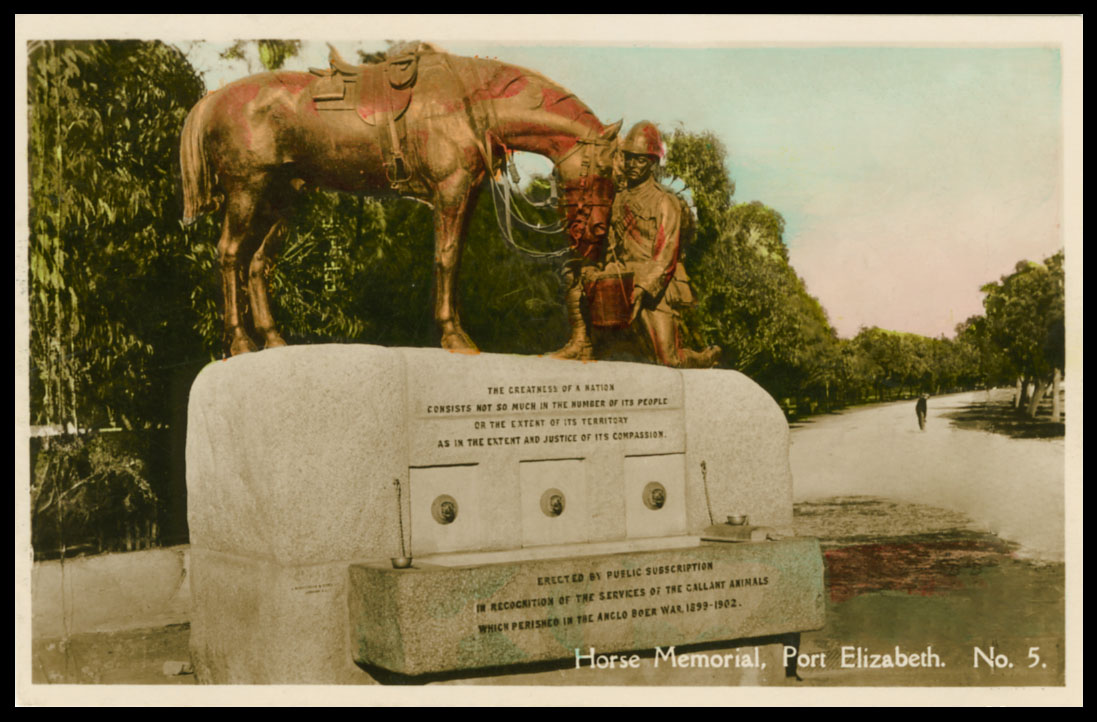
Circa 1905. Postcard. 'Horse Memorial, Port Elzabeth. No. 5'.
An estimated 300,000 horses died in British service during the SAW.
Worldwide there are only a handful of equestrian statues showing the contribution of horses in war.
This statue was previously regarded as one of the most beautful of its kind.
Note that this statuee refers to the war as the 'Anglo-Boer War'.
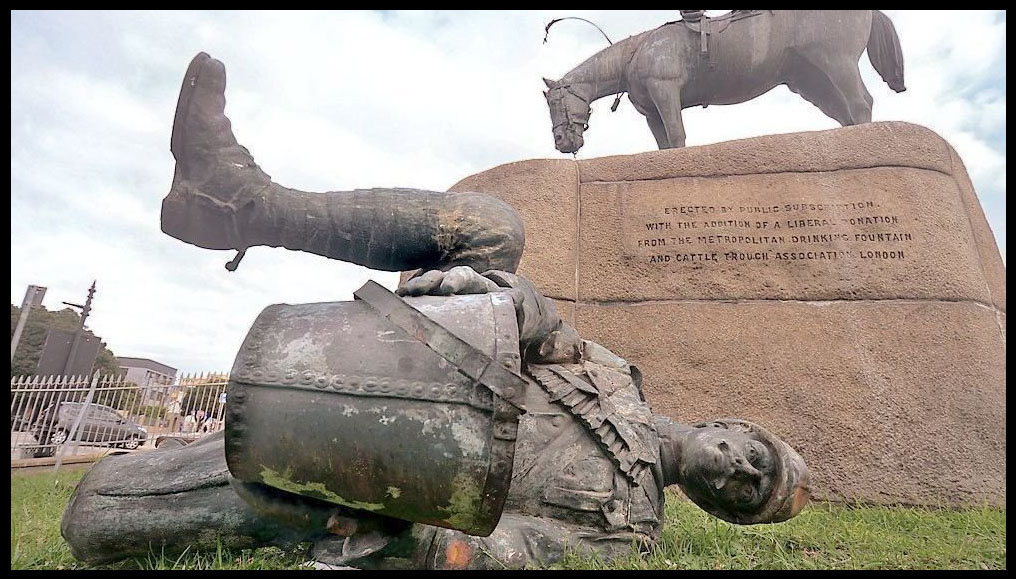
2015. This is what happens when you deny people their country's history!
The monument was vandalised by politically motivated activists. It worked. It got my attention!
Would this have happened if the South African War was owned by all its people?
Of most interest to me among the stamps on the US Post Office sheet is Stand Watie, the slave-owning native American who fought for the Confederacy. He had his own political motivations that generally do not sit comfortably with today's woke, revisionist Democratic correctness. Watie was not so much fighting for the South in order to keep his slaves but rather to keep the land on which he and his people lived, land that had beern constantly stolen and eroded by treaty and treachery. He believed that his betrayed native-American people would get a better, straighter deal from the Southern Confederates than from the forked-tongued politicians in Washington. (Shades of 'The Outlaw Josey Wales'!)
General U S Grant, a late-comer to the Republican Party, was one of the most progressive politicians of his era in terms of giving post-war justice to Blacks and native-Americans alike, attempts that were ultimately scuppered by southern Democrats who wanted to maintain their old status quo. According to Chernow, "Americans today know little about the terrorism that engulfed the South during Grant's presidency. It has been suppressed by a strange national amnesia. .... By the end of Grant's second term, white Democrats, through the 'redeemer' movement, had reclaimed control of every southern state, winning in peacetime much of the power lost in combat. They promulgated a view of the Civil War as a righteous cause that had nothing to do with slavery but only states' rights - to which an incredulous James Longstreet" (himself a senior Confederate Lieutenant-General) "once replied "I never heard of any other cause of the quarrel than slavery"." How did the Democrats get away with it? How did the the party of slavery re-invent itself as the American Left?
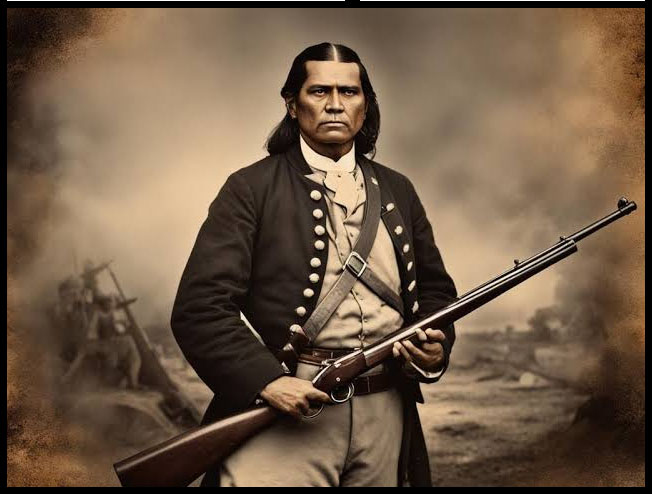
Circa 1860. Stand Watie, also known as Standhope Uwatie and Isaac S. Watie.
A prominent Cherokee leader and Confederate General in the US Civil War.
He was the second principal chief of the Cherokee Nation from 1862 to 1866.
He was the only Native American to hold the rank of General in the Confederate Army.
He was also the last Confederate General to surrender at the end of the Civil War.
Source: Medium.
There is a tenuous connection between Stand Watie and South Africa and the South African War. Colonel John Blake, the leader of the Boer's Irish Brigade, was a West Point graduate and ex-US 6th Cavalry officer who had served in the Apache wars and exchanged gifts with Geronimo. He claimed to have some Cherokee blood. (His great-grandson, Michael Blake, wrote the bestseller 'Dances with Wolves'.) Blake's Indian ancestry is disputed but it is believed that his older brother Larkin and his cousin James Wyeth Blake "traded as white" (Golden Nemesis. Heather Vallance. 2009.). Both fought with Brigadier-General Watie at the Battle of Pea Ridge, Arkansas. Colonel John Blake was the badly wounded hero of Pepworth Hill during the Siege of Ladysmith. His book, "A West Pointer with the Boers", copyrighted in 1903 and published in 1904, uses the term "Anglo-Boer War", one of the earliest examples of such use.
Another American supposedly involved in the South African War was Tom Mix, the Western hero of the silent screen. Mix reportedly broke wild horses in Denver for the use of the British military in the war. Other accounts also have him travelling to South Africa to deliver these horses to the British Army. Quite how he managed to participate in the Siege of Ladysmith where he supposedly received wounds to his shoulder and arm is hard to fathom. The legend of Tom Mix is deep and murky, rather like that of Ranse Stoddard, the "hero" who shot Liberty Valance, even though another man, Tom Doniphon, actually did it. The iconic phrase "When the legend becomes fact, print the legend" highlights how the West's mythology often prioritised storytelling over truth. Below is an image of John Wayne who played Tom Doniphon in 'The Man Who Shot Liberty Valance' (1962). Wayne is seen standing in a classic Tom Mix pose at the end of John Ford's 'The Searchers' from 1956. . This is Wayne's tribute to Tom Mix's influence on him and the Western movie.
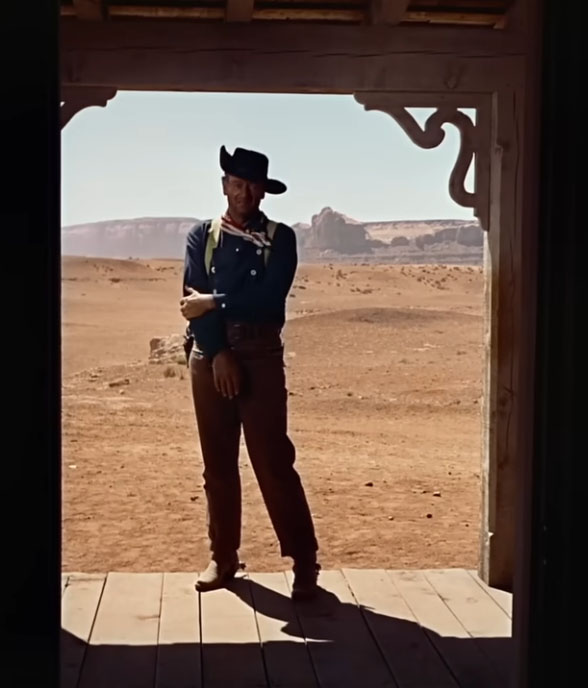
1956. 'The Searchers'. Directed by John Ford.
"Ride away. Ride away".
No doubt, some are wondering how I can be so liberal and also be an obvious fan of the Western genre. A short answer is that I am neither liberal nor woke. I believe in facts, the truth. Everyone, left or right, should be the possessor of these same facts. If you do not accept them and or do not believe them but prefer instead your own manipulated political prejudices, you are no longer honest.
The Searchers' is widely regarded today as a racist movie. In its defence it is a product of its time, a reasonably realistic look at the adversity our pioneering ancestors lived with. It depends, perhaps, how you view 'The Searchers'. If all it is to you is entertainment, then it is racist and gratuitously so. But if you view it as an historic attempt to create a reasonably accurate portrayal of the savage interaction between settlers and native-Americans in the American south-west in 1870 then you are less likely to be offended by it. It is pretty much how things were. One hase no pleasantries for one's enemies in a world where it is kill or be killed. John Ford has recreated a time and place we are lucky not to have to live in.
And finally, as this is a philately club, here is a stamp of someone we would be honoured to have as a member.
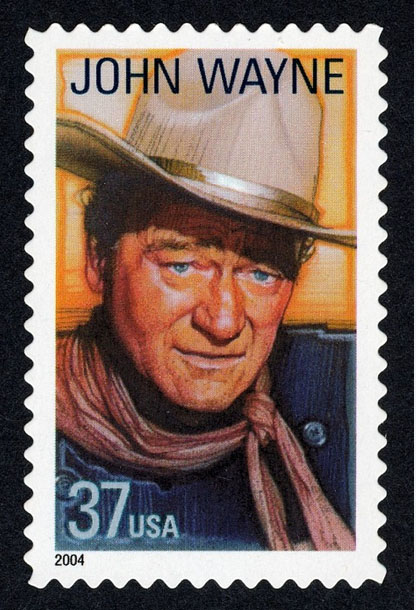
This tenth stamp in the US Post Office's Legends of Hollywood Series honours the American film legend, John Wayne. Artist Drew Struzan based his painting for the stamp on a black-and-white publicity still of Wayne taken during the filming of "The Man Who Shot Liberty Valance", directed by John Ford (1962). Ford made many movies with John Wayne including a trilogy of Cavalry movies. My favourite is probably his 'She Wore a Yellow Ribbon' (1949). In this John Wayne plays the role of Captain Nathan Brittles, a grizzled veteran of the west and the Civil War. His advice to the junior officers is “never apologize, mister, it’s a sign of weakness.”
So, no apologies for any of this then! Here you have it!
In South Africa we did not commit genocide with small pox blankets and massacres as they did in the USA. We defended ourselves in laagers of circled wagons as we trekked into the interior when attacked by treacherous Zulus and hostle Matabele. Yes, we drove them out and burned their villages but they started it. Yet still we would live with them but separately. We had our locations and Homelands just as the USA had its reservation and downtown ghettos. The difference, perhaps, is that our ancestors decided to live among native Black Southe Africans, not destroy them as happened to the indigenous population in America. Back then our ancestors believed that Blacks and Whites were different and segregated the country in order that each group and culture could retain their identity. Yes, the Whites did unfairly occupy over 80% of the land in SA just as Americans did in the USA. White South Africa recognised it had created the failed policy of Apartheid, something not unlike southern segregation in the USA. White South Africa democratically surrendered political power to the Black majority. There was no war over this matter, just negotiations done in good faith. It was a wonderfully generous, idealistic and bold thing for the Nationalists to do with the ancient enemy. It was totally polically correct but look where it got us!

